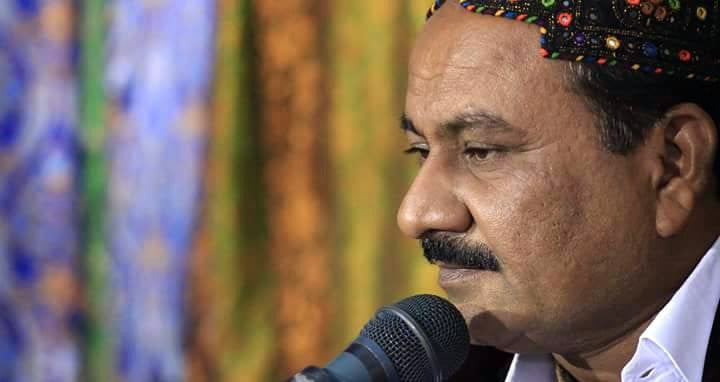
Remembering the quintessential voice of Thar, Sadiq Faqir who died of an accident last week

Mithi is going to witness a cheerless Holi this time round. Usually its streets bathe in colours on this religious festival of Hindus. But this year, all the colours faded as the town awaited the arrival of the dead body of its finest son Sadiq Faqir who died in a tragic road accident in Saudi Arabia on Feb 26. His vehicle collided with a tanker when he was returning after performing Umrah.
A leading folk singer of Thar, Faqir’s untimely death has left a pall of gloom across the whole southern region of the Sindh province. He was a gem of a musician whose somber voice was rightly referred as the metaphor for Babeeho (a bird in Thar who sings only during night and dies silently in periods of drought).
Belonging to the traditional Muslim singer community popularly known as Manganhars in both India and Pakistan, Sadiq Faqir had inherited the legacy of his teacher and Uncle Muhammed Hussain Faqir who was also an acclaimed folk singer of Tharparkar. The gracious teacher bestowed on his hardworking pupil the mastery over both classical and folk music. He beautifully amalgamated both genres and created an aura of his own.
Usually in Thar, Manganhars perform only on occasions such as weddings but Faqir left his parental stronghold and explored new avenues for his talent. He started his career from Radio Pakistan Hyderabad in 1986 and started singing the kalam of modern and progressive Sindhi poets like Shaikh Ayaz, Imdad Hussaini, Haleem Baghi, Hassan Dars, Ayaz Gul, Adal Soomro and many others.
It was a time when Sindhi music was a hostage to cassette companies and a coterie of commercial poets and singers. Swimming against the tide was a risky business but he hailed it and successfully changed people’s taste for music. He in fact revamped that whole landscape of Sindhi music through his style and people literally started dancing on his melodious tunes.
‘‘It is the voice that my poetry was searching for since ages.’’ These words of praise for him by the doyen of Sindhi poetry Shaikh Ayaz stand testimony to his credentials.
Faqir had enjoyed the love and respect of a wide range of audiences. Whether it was a nationalist parties’ gathering or a cultural show in any university or a literary event, he had dominated the stage for more than two decades. He was arguably the best example of interfaith harmony that used to go and sing at shrines, temples or any religious place with equal zeal.
The day he died people of Mithi played Bhajjans (Hindu religious songs) in the temples which were actually sung by him. The last time I heard him sing was at Umerkot on the birthday celebration of ancient mystic poet Bhagat Kabir organised by the local Hindu panchayet.
As noted nationalist politician and writer Abdul Wahid Arisar had rightly said, "His voice reverberates in the sand dunes and compels the desert to laugh and cherish. It has brought happiness to the struggling and sorrowful lives of Thari people".
Unlike many others associated with this art of music, Faqir was a well-educated and established person. He was a teacher at Government High School Mithi. To him, music was the passion not a source of livelihood which he pursued and left indelible impressions in the form of hundreds of melodies.
He has immortalised Shah Latif’s poetry about Marvi and Thar. In one of Shah Latif’s couplets that he sang, Marvi says while she is in exile ‘I would be alive even after death if my dead body reaches my motherland’. Incidentally, he himself left this world in very odd circumstances in a strange land and his dead body took almost a week to reach his native land.
Being a generous host and a loving human being, Sadiq Faqir used to invite his friends from other parts of the province to come and witness the festivities of Holi in his native town. Sadly, his friends have gathered in Mithi this time but for a very different purpose and with a heavy heart. Rest in peace!